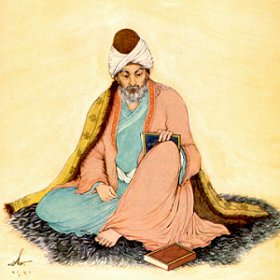 Sri Aurobindo’s optimism about poetry may be contrasted with the scepticism of Maulana Jalaludddin Rumi (1207-73), the great Persian poet, philosopher, sage, mystic and Sufi master. And the reaction of ‘literary critics’ to Aurobindo’s work may help us to understand Rumi’s attitude.
Sri Aurobindo’s optimism about poetry may be contrasted with the scepticism of Maulana Jalaludddin Rumi (1207-73), the great Persian poet, philosopher, sage, mystic and Sufi master. And the reaction of ‘literary critics’ to Aurobindo’s work may help us to understand Rumi’s attitude.The Mathnawi-i- Manawi (Spiritual Couplets) is considered Rumi’s masterwork – six books of poetry and imagery of such power in the original that, according to Sufi writers, its recitation produces a strangely complex exaltation of the hearer’s consciousness. Prof Arberry calls Rumi the greatest mystical poet in the history of mankind. But while excelling in literary and poetic ability beyond all his contemporaries, Rumi constantly affirmed that such an attainment was a minor one compared with Sufihood. He often claimed not to be a poet at all.
What is poetry that I should boast of it,
I possess an art other than the art of the poets.
Poetry is like a black cloud; I am like the moon hidden behind its veil.
Do not call the black cloud the luminous moon in the sky.
Poetry was only a secondary product. He did not regard it as any more than a reflection of the enormous inner reality which was truth, and which he calls love. The greatest love, as he says, is silent and cannot be expressed in words. Although his poetry was to affect men’s minds in a way that can only be called magical, he was never carried away by it to the extent of identifying it with the far greater being of which it was a lesser expression. At the same time, he recognised it as something which could form a bridge between what he ‘really felt’ and what he could do for others.
Rumi assumed the role of critic of poetry. People come to him, he says, and he loves them. In order to give them something to understand, he gives them poetry. But poetry is for them, not for him, however great a poet he may be – “What, after all, is my concern with poetry?” He states categorically that in comparison with the true reality, he has no time for poetry. This is the only nutrition, he says, that his visitors can accept, “so like a good host he provides it.”
The Sufi must never allow anything to stand as a barrier between what he is teaching and those who are learning it. Hence Rumi’s insistence upon the subsidiary role of poetry in the perspective of the real quest. What he had to communicate was beyond poetry. To a mind conditioned to the belief that there is nothing more sublime than poetic expression, such a feeling might produce a sense of shock. It is just this application of impact that is necessary to the Sufi cause, in the freeing of the mind from attachment to secondary phenomena, “idols”.
Ref: Idries Shah, The Sufis, and S H Nasr, Islamic Art and Spirituality.
Miniature painting of Rumi by Hossein Behzad


1 comment:
Greets to the webmaster of this wonderful site. Keep working. Thank you.
»
Post a Comment